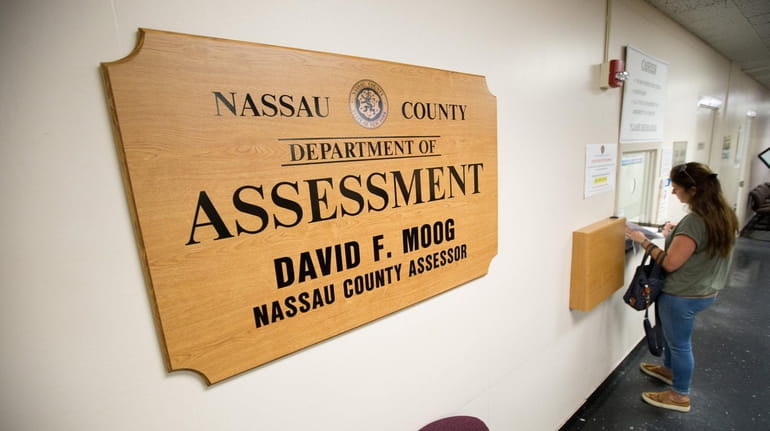Letter: Perplexed by reassessments

The Nassau County Department of Assessment in Mineola on Oct. 3, 2018. Credit: Barry Sloan
The headline of your Feb. 24 story on Nassau County property valuations, immediately raised questions for me [“Nassau reassessment adds location factor,” News]. Will this create even more errors? How can pinpointing a neighborhood, with so many varied homes and values, help average homeowners? And how can we understand such a complex formula in trying to figure out our own taxes?
To cap it off, why haven’t the county added another key element to the model: income?
I have long advocated for an “ability to pay” basis for property taxes. If Nassau can so easily look at neighborhood sales when reassessing my property, why can’t it look at my income? Household income is just as important, if not more so, than the neighborhood? Why underestimate the importance of the homeowner? Is it an attempt to maximize return on the investment in a more complicated reassessment system?
I am very disappointed in this government’s attempts, or lack thereof, to make Long Island affordable. Our aging population is dying off and young people are moving away. Start thinking outside the box.
Judith Kelsey,
Merrick
Nassau County’s old valuation on my house was $215,000, which I admit was too low, and now it says the figure is $565,000. I want to understand why, but the county denied my Freedom of Information Law request for details on exactly how it determines a home’s value. The county told me the formula is owned by a consultant hired by Nassau and is proprietary.
I can’t find the logic. For example, because I have a bathroom with a shower stall, in addition to the standard toilet, sink and tub, the county increased the valuation of my entire house by 10.18 percent! (About $50,000 in value for my house.) I asked the Department of Assessment to check whether this was a decimal error. Perhaps it meant 1.18 percent? After I raised the issue, a senior assessment official agreed to reduce the $50,000 to $45,000 for the 9 square feet of my shower stall, leaving my shower valued at $5,000 a square foot! This official said the computer system wouldn’t let him do more; I would have to file a grievance.
Other homes in my area have this same disproportionate adjustment. I suspect the error is countywide, but we can’t tell because the county won’t release the formula.
Dennis J. Duffy,
Lynbrook
National debt is getting too high
Our national debt is $22 trillion, and the annual interest is $325 billion [“Trump ignores true emergency,” Opinion, Jan. 11]. I am sorely disappointed in all our leaders who have ignored this problem. Our federal government needs to be reduced by eliminating waste, failed programs and redundancy. Turn many of its powers over to the states. Education and housing are two agencies that come to mind for elimination. Social Security, Medicaid and Medicare all have problems with massive fraud and negligence. Tell your elected leaders to get on this before the interest payment becomes so large it triggers a crisis.
Gregg Freedner,
Ronkonkoma
Crack down on those who avoid taxes
Your coverage of the trial of Linda and Edward Mangano has brought to light how prosecution witness and former restaurateur Harendra Singh paid employees partly with checks and partly in cash [“A little matter of seniority,” News, Feb. 21].
A big reason an employer might do this is not only to evade federal and state income taxes, but even bigger, to save some portion of his and his workers’ contributions to Medicare and Social Security through taxes.
The amount that both the employer and employee pay exceeds 15 percent of an employee’s pay. Imagine how many owners in food services or other industries pay their workers in part or all under the table everywhere in the country. We are talking about billions of dollars.
Yet we hear our Social Security and Medicare funds are drying up. How about cracking down hard on all of these employers to replenish our failing Social Security and Medicare funds?
Albert J. Prisco,
East Northport
Start ticketing offenders on the LIRR
The Long Island Rail Road’s website shows a long list of things riders should not do on trains, from occupying more than one seat to fighting to littering [“Bad behavior and the ‘share’ option,” News, Feb. 18]. Violators can be ticketed or ejected.
Given the LIRR’s continuing problems with litter and misbehavior, it would make sense to assign plainclothes Metropolitan Transportation Authority police to ride trains to enforce the rules. This would result in financial penalties to offenders and discourage others problems.
As a hearing officer for New York City Transit’s Adjudication Bureau, which handles infractions in subway conduct, I take the LIRR every week to Brooklyn. I see construction workers at the end of the day soiling seats by putting their boots up and preventing others from sitting.
A ride on the subway is $2.75 and, yet, NYC Transit considers it a valuable customer concern to enforce its rules of conduct. The LIRR charges a lot more money and should do more to enforce its own rules.
Gerard Loughran,
Garden City
